INTRODUCTION
On January 10, 2025, a writ petition for transfer of multiple cyber complaints against a petitioner claiming to be a victim of a fake stock market investment was dismissed by the Supreme Court of India. The case showcases an intermingling of cybercrime, victims’ rights, and jurisdictional complexities within the Indian court system. By refusing to intervene in Article 32 of the Constitution, the Supreme Court supported the idea of decentralized investigations, observing the need for self-restraint by the courts.
BACKGROUND
The petitioner is a resident of Panipat, Haryana, and was victimized by a stock-market investment scheme, which went under the name of a WhatsApp group. This scheme was purportedly working on unrealistic high returns, encouraging the petitioner to invest a sum of INR 6,65,000. The petitioner initially made high profits but, following that, became suspicious and asked for a refund. This was made in three separate transactions. Thereafter, three cyber complaints were lodged against him, separately in Andhra Pradesh, Tamil Nadu, and Gujarat, all alleging his involvement in the fraud.
The petitioner, through his plea, contended that all complaints ought to have emerged from the same cause of action and that all complaints involved one cooperative fraudulent transaction. The petitioner invoked his fundamental Articles 21 rights, arguing that fragmented investigations would violate his right to life, personal liberty, and fair investigation. He called for the complaints to be huddled together and transferred to any one jurisdiction for disposal.
KEY POINTS
- Fraud in Question: The petitioner fell victim to a cyber fraud involving a fake stock market app hyped in a WhatsApp group. He was further manipulated into losing all his hard-earned money on the pretext of high-profit investments.
- Multiplicity of Complaints: Three different complaints have been made against the petitioner in different states that also involve the same transaction. The petitioner contends that these complaints were made with the motive of needless harassment and extortion.
- Grounds for Transfer: Jurisdictional coincidence and the principles of justice were raised by the petitioner’s counsel as a ground for consolidation of cases. The plea was then filed under Article 32 invoking writ jurisdiction of the Supreme Court.
- Reasoning of the Supreme Court: The bench, comprising Justices Bela M. Trivedi and P.B. Varale, rejected the petition stating that it is not inclined to entertain the matter under Article 32. The court emphasized that such cases ought to be promoted by the appropriate authorities in their jurisdictions.
RECENT DEVELOPMENTS
The court’s dismissal of the petition highlighted the shared difficulties courts face in interpreting multiple jurisdictions in cyber-crimes. It strengthens the argument that coordination between police agencies on the state level is necessary while undertaking an investigation in cases of cross-border transactions and cyber-frauds. Meanwhile, the petitioner in the plea is already facing investigations in Andhra Pradesh, Tamil Nadu, and Gujarat: the police in these states investigate the truth of allegations against him and unravel the bigger network of the cybercriminals involved. The case has brought discussions regarding the adequacy of the existing cybercrime laws, and the provisions for an authority-center, which can act as a single window to address complaints of cybercrime across jurisdictions.
CONCLUSION
The Supreme Court’s decision on its refusal to entertain the plea highlights and reinforces the significance of empowering the jurisdiction of law in criminal investigation exercises to guarantee the citizens justice. It serves as a very telling fact that further complicates matters of prosecuting cybercrimes, as several potential victims might find themselves wrongly implicated. This indicates that there is a need for an enhancement to be made to the existing rules prompting the policy-makers to simplify the procedure for handling multijurisdictional registration of cybercrime cases. Improved inter-agency collaboration, along with forward-looking technological support for forensic investigations, is required for sundry other cases that are equally involved. The court’s ruling further reiterates that the dispensation of jurisdictions pertaining to challenging an authoritative decision under Article 32 of the Constitution cannot be invoked as a remedy for all grievances and that they ought to indeed pursue a proper channel of law invoked for redress.
“PRIME LEGAL is a full-service law firm that has won a National Award and has more than 20 years of experience in an array of sectors and practice areas. Prime legal falls into the category of best law firm, best lawyer, best family lawyer, best divorce lawyer, best divorce law firm, best criminal lawyer, best criminal law firm, best consumer lawyer, best civil lawyer.”
WRITTEN BY: SAGORIKA MUKHERJEE


